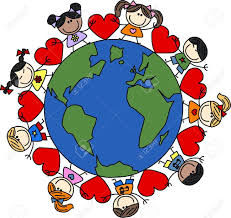Renewing War-Torn Communities Through Forgiveness Education
Renewing War-Torn Communities Through Forgiveness Education
Forgiveness is a prospect for peace.
Gandhi has said that if true peace
is ever to be achieved in this world, if we are to make war against war,
then we must begin with the children. Peace out there in the world is possible only when we have peace inside of us and that can take years to develop. After three decades of studying the moral virtue of forgiveness,
I am convinced that forgiveness is the missing piece to the peace
puzzle. Over a dozen social scientific studies conducted in our lab at
the University of Wisconsin-Madison demonstrate that as people forgive,
they become less angry, depressed,
and anxious, and more hopeful of their future. This includes children who have forgiveness education in school (Enright & Fitzgibbons, 2015).
 It is our contention that if we can educate a majority of students in
a community, particularly communities in contentious world regions, in
the fine art of forgiving, then that community is likely to become more
peaceful in the decades to come as the children enter adulthood and
apply forgiveness to family, work, and other community contexts.
Forgiveness-as-a-moral-virtue is defined as an expression of mercy as
the offended person offers the cessation of resentment and the unmerited
gifts of compassion, beneficence, and love
toward a person or persons who were unfair. To forgive is not to excuse
the other’s injustice, ignore the seeking of justice, or even
reconciling if the other is dangerous. If people are to grow in the
expression of the virtue, then they might start with rudimentary
expressions and then progress to more subtle and sophisticated
expressions with age and practice, pointing to the necessity of starting
with children and advancing through the grade levels.
It is our contention that if we can educate a majority of students in
a community, particularly communities in contentious world regions, in
the fine art of forgiving, then that community is likely to become more
peaceful in the decades to come as the children enter adulthood and
apply forgiveness to family, work, and other community contexts.
Forgiveness-as-a-moral-virtue is defined as an expression of mercy as
the offended person offers the cessation of resentment and the unmerited
gifts of compassion, beneficence, and love
toward a person or persons who were unfair. To forgive is not to excuse
the other’s injustice, ignore the seeking of justice, or even
reconciling if the other is dangerous. If people are to grow in the
expression of the virtue, then they might start with rudimentary
expressions and then progress to more subtle and sophisticated
expressions with age and practice, pointing to the necessity of starting
with children and advancing through the grade levels.
Some people live with injustices that are not likely to end in their lifetime. Forgiveness will not solve this kind of entrenched injustice, but it will heal individuals, families, and communities from the damaging effects of the injustice (deep resentment, hatred, and the resulting anxiety, depression, and hopelessness that too often accompany unsolved injustice). A quest for justice is good and important. Yet, the quest for justice alone in these circumstances can lead to frustration, anger, the displacement of that anger onto one’s own children and community members, leading to serious psychological compromise. Forgiveness can reverse and prevent these negative effects.
A Future with Forgiveness
Within world conflict zones, we would like to see at least two generations of students (a 24-year vision) introduced to forgiveness with an increase in the developmental challenges for the students each year. By the end of secondary school, the students should have a strong foundation in understanding the term forgiveness, know the nuances of forgiving and receiving forgiveness, and have insights into how to give back to the community. It is our hope that they might consider giving back to the community by introducing others to the concept of forgiveness and its application within friendship, family, and community groups.
 Might these students, once they are adults, begin to see that all
people possess inherent worth? Might it be a contradiction to one’s own identity
to disparage people from “the other side” just because of where they
were born, what they believe, or the color of their skin? Forgiveness
education can make this possible as unhealthy anger first is removed
from the heart, which then can allow the person to see more clearly:
others have worth, as I do. We can strive together for peace, and even
if the other refuses this gift, the forgivers receive the unexpected
gift of inner healing despite the continued injustice against them.
Might these students, once they are adults, begin to see that all
people possess inherent worth? Might it be a contradiction to one’s own identity
to disparage people from “the other side” just because of where they
were born, what they believe, or the color of their skin? Forgiveness
education can make this possible as unhealthy anger first is removed
from the heart, which then can allow the person to see more clearly:
others have worth, as I do. We can strive together for peace, and even
if the other refuses this gift, the forgivers receive the unexpected
gift of inner healing despite the continued injustice against them.
and anxious, and more hopeful of their future. This includes children who have forgiveness education in school (Enright & Fitzgibbons, 2015).

Source: Viktor88 | Dreamstime
Some people live with injustices that are not likely to end in their lifetime. Forgiveness will not solve this kind of entrenched injustice, but it will heal individuals, families, and communities from the damaging effects of the injustice (deep resentment, hatred, and the resulting anxiety, depression, and hopelessness that too often accompany unsolved injustice). A quest for justice is good and important. Yet, the quest for justice alone in these circumstances can lead to frustration, anger, the displacement of that anger onto one’s own children and community members, leading to serious psychological compromise. Forgiveness can reverse and prevent these negative effects.
A Future with Forgiveness
Within world conflict zones, we would like to see at least two generations of students (a 24-year vision) introduced to forgiveness with an increase in the developmental challenges for the students each year. By the end of secondary school, the students should have a strong foundation in understanding the term forgiveness, know the nuances of forgiving and receiving forgiveness, and have insights into how to give back to the community. It is our hope that they might consider giving back to the community by introducing others to the concept of forgiveness and its application within friendship, family, and community groups.

Source: International Forgiveness Institute, Inc.

